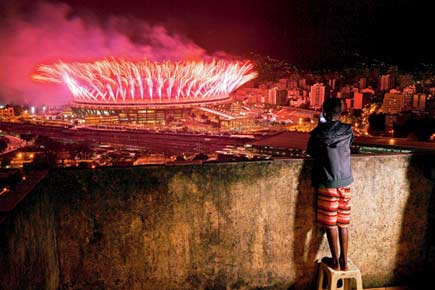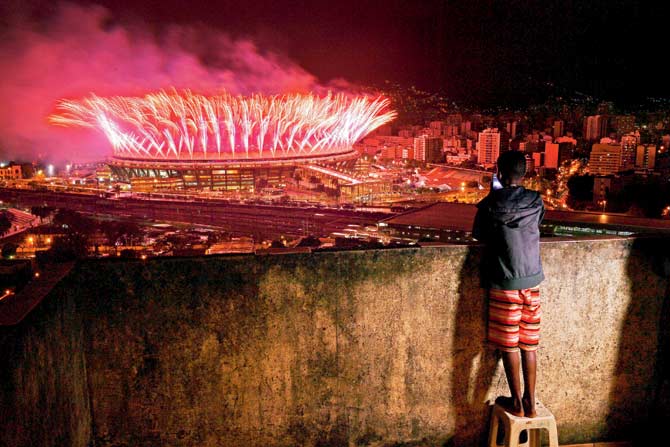Detractors may grumble about what a waste of money the Olympics are, but they are silenced as soon as the world’s best athletes perform

 After every Olympic Games, three kinds of people emerge. One lot will talk about the triumph of the human spirit and the oneness of sport. The second will talk about how the money could have been better spent on more important matters like poverty alleviation. The third will talk about how the host city will get no economic benefit from the Games.
After every Olympic Games, three kinds of people emerge. One lot will talk about the triumph of the human spirit and the oneness of sport. The second will talk about how the money could have been better spent on more important matters like poverty alleviation. The third will talk about how the host city will get no economic benefit from the Games.
ADVERTISEMENT

A boy from a slum in Mangueira watches fireworks over Maracana Stadium during the 2016 Olympics closing ceremony in Rio de Janeiro on Sunday. Pic/AFP
As for category 2, you can make the same argument about every single human activity that does not help in poverty alleviation. Why make movies? Why make diamond-studded wrist watches? (Actually here I agree — what is the purpose of a diamond-studded wrist watch except vulgarity?) Why drive a car? Why live in a house and so on.
Category 3 is the sort that only values life by its economic cost or benefit. But these are not usually people who live in shanties and scratch out a basic existence.
They look on to the shanty town from their glass-fronted towers calculating how shanty-town land could be better utilised by some fancy developer in a diamond-studded wrist watch. (I suspect that these people will watch Premier League matches in fancy bars and decide that the pleasure they themselves get from each extravagantly paid footballer and marked-up beverage offsets the costs.)
I belong in category 1, unashamedly. To me, the correlation between a sporting event and the suffering of the economically underprivileged is a weak one. Humans need various outlets and sport has its origins in our beginnings. We might as well also destroy all the beauty that we have created since there are, tragically, so many who manage without. And yet, it is often those from the less-privileged backgrounds who see sport as a form of self-affirmation and of release. Do not so many of India’s athletes fight against all those odds to compete in international events? Are they to be denied that because building a stadium costs money?
It is remarkable to me that the narrative around the Games never changes. The first step is to decide, before the Games, that the host city is a terrible place with all kinds of dangers lurking in every side alley. The next step is to corroborate that decision with plenty of evidence. Rio de Janeiro had the distinct disadvantage of being in a non-North American, non-West European nation which tripled the possible perils from politics, viruses and passing criminals.
The same things were said about the Commonwealth Games when they were held in Delhi (we shall step aside now for the incredible corruption, the gentleman who said so what if toilets are dirty: these westerners have different standards, the toilet paper which cost R3,000 a roll and all our other wonderful achievements. At the end of the day, the Games were a success).
They said it about London, which has more advantages than most. They said it about Beijing, in that strange dichotomy the world has about claiming to hate China’s human rights violations while falling over itself to do business with China. They said it about South Africa when it hosted the Football World Cup.
And yet, after sportspersons start displaying their skill, the naysayers, the accountants and the self-righteous appear to vanish. The sights of Rio were breathtaking, from the once beleaguered Guanabara Bay to the hills around it. But even these spectacular vistas had to compete with the greatest athletes of the times, performing at their peak. How miserable must you be as a person if the sight of Usain Bolt running faster than any human on the planet does not thrill you?
Of course there will have been glitches and mistakes. That is how life works. But in spite of all possible and real problems, how can you not salute the inspiration and achievement of the world’s best?
As for Rio, the biggest ‘criminal’ act turned out to be by a much-decorated American swimmer and his teammates who made up a story of being robbed at gunpoint. Ryan Lochte managed to get back to the USA safely but his compatriots were caught in the thick of it when it turned out that they were the ones who had vandalised property and tried to get away with it when confronted by a security guard.
Danger lurks in strange places when you host the Olympics it seems.
Ranjona Banerji is a senior journalist. You can follow her on Twitter @ranjona
 Subscribe today by clicking the link and stay updated with the latest news!" Click here!
Subscribe today by clicking the link and stay updated with the latest news!" Click here!






